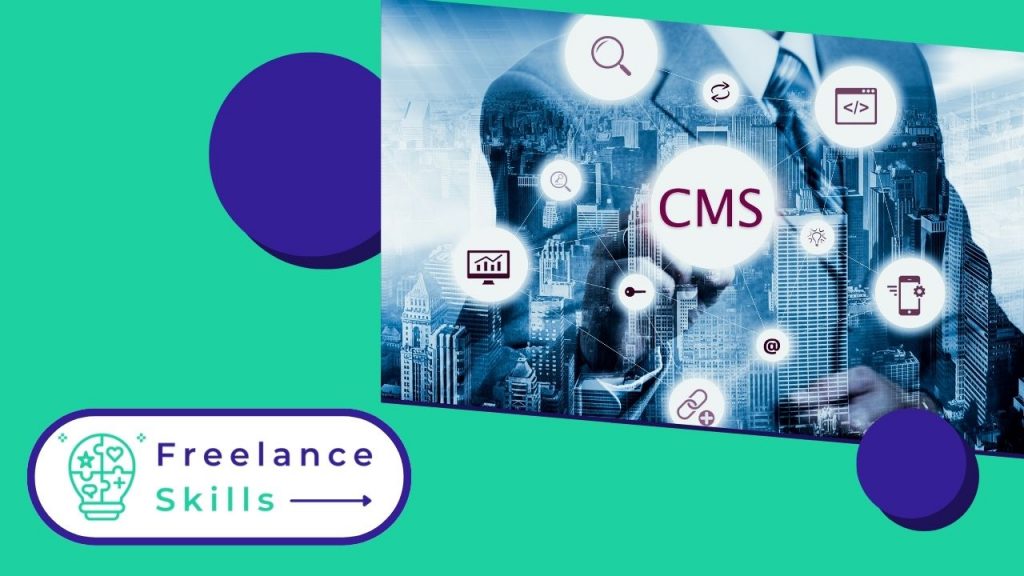In the past, creating a website required expertise in CSS, HTML, PHP, JavaScript, and other programming languages. Fortunately, the advent of content management systems (CMS) has simplified the task. Today, simply choosing a quality CMS is enough to design a site without extensive coding skills. There are several CMS available, each offering its own advantages. This article will guide you in choosing the best CMS for the creation and efficient development of your website, according to your specific needs.
CMS or Content Management System : What is it ?
Content management system concept and operation
Choosing the wrong CMS harms your company’s image (loss of visibility on search engine results). It also costs you time and money. So you have to ask yourself, what’s the best CMS to create a website ?
First of all, CMS or content management system is a tool that allows you to set up a website and optimize the management of its content thanks to a variety of features. Thanks to CMS, you no longer need to create all the pages of your websites, but can use pre-designed page templates. To put your content (blog, pages or products) online via a content management system, all you have to do is integrate the content to be published on a text editor and choose the type of content in the section dedicated to this. This will give you access to a dashboard or administration panel. The latter will be updated regularly so that you can make the most of various features as well as any new extensions.
Nuance between CMS content management systems and website creation software
CMS and website creation software are solutions for creating your own website. These two solutions are similar in the sense that they do not require technical knowledge of web development or code to create sites. However, they are quite different.
The main point of difference between these two solutions lies in hosting. Indeed, the website creation software has the special feature of managing your chosen hosting for you. It also gives you, for a successful user experience, a tool that will enable you to develop your website easily.
The CMS, on the other hand, doesn’t take care of the hosting aspect of your website. So you have to take care of it like a real web developer. Don’t worry, this isn’t difficult at all, since the majority of web hosting solutions are easy to get to grips with. What’s more, by choosing a CMS instead of a site builder, you’ll have more advantages. Indeed, the CMS is more flexible and will give you access to various functionalities, themes, plugins, etc.
What are the different types of CMS tools?
Do you want to know which is the best CMS for creating a website ? To answer this question, we first need to clarify a few details.
When you create a web project to create your website or e-commerce, you have to choose between different CMS tools. To do this, you need to distinguish between a hosted content management system and a self-hosted content system. To be able to compare them, you need to focus on a few things:
- Offers and rates
- Access to source code
- Domain name
- Hosting
- Updated
- Technical support
- Payment and delivery
Hosted / Open source content management system or CMS
- Offers and pricing : The Hosted CMS can be downloaded freely and free of charge. You will then be required to add paid plugins depending on your website’s needs. You’ll also need to take charge of all the technical aspects of your website, such as hosting, backups, various settings, etc.
- Source code access : This CMS is totally free. It can be downloaded by anyone and can be enhanced or corrected by users.
- Domain name : You will be the only one to manage the purchase of your domain name as well as its reservation and renewal.
- Hosting : It’s up to you to manage your hosting as you see fit. However, you can always hire freelance developers like at BeFreelancr to help you with the process.
- Updates : Updates to your site don’t happen automatically. You’ll need to do them to keep your site optimized. The only downside is that your updates may not be compatible with your source code.
- Technical support : With an Open source CMS, you’ll have the advantage of turning to an online community if you need help. In fact, there are many forums that can provide solutions to your problems
- Payment and delivery : When using an Open Source CMS, it’s up to you to configure your website’s payment and delivery methods. However, you must choose them and add them through paid plugins.
- Examples : WordPress, Drupal, Prestashop, WooCommerce, etc.
Content management system or self-hosted / proprietary / Saas CMS
- Offers and pricing : The self-hosted CMS is completely pay-as-you-go. It is therefore a solution with a monthly subscription. All services or technical aspects of this CMS are included in the subscription.
- Source code access : The source code of this CMS is not accessible to everyone. As a result, the company is responsible for programming the site and all additional developments. This CMS is ideal for beginners or people with no knowledge of computer languages.
- Domain name : This CMS offers you paid domain name management services. However, you always remain the owner.
- Hosting : The hosting of your site will be included in your monthly subscription. If your site generates more traffic or your product catalog expands, the provider can offer you a better hosting solution.
- Updates : Site updates are done automatically. This ensures a stable, scalable and fully performing website.
- Technical assistance : If you have any questions about managing your site, you’ll benefit from technical assistance available at all times.
- Payment and delivery : With a self-hosted CMS, these payment and delivery methods are pre-installed on your website. All you have to do is click a few times to activate them and set them up as you wish.
- Example : Shopify, Wix, Shopapplication, etc.
What are the criteria for choosing the best CMS to create a website?
To find the best CMS for our website, we need to focus on certain important criteria.
The ease of use of the website content management system
.
A CMS always seems complicated. But in reality, it’s often easy to use. In fact, it’s this ease of use that makes a CMS a good one. So it’s important to find a CMS that isn’t complicated and therefore easy to understand.
Also bet on a reactive CMS to avoid wasting time during every modification made to the platform. For this, choose a CMS that offers caching to increase site loading speed.
Various website design options
To make your job easier and design a website efficiently, opt for a CMS that has numerous templates or site design templates. The quality of the various resources and the availability of each one will then be very important to the successful creation of your website. In other words, it will enable you to quickly and easily find answers to your questions about how to create a high-performance site.
Various website migration features
The migration options are among the essential criteria to consider when choosing a good CMS. Given that your site is in its launch phase, thinking about migrating to another CMS seems pointless. Over time, however, your site will grow and its current needs will no longer be its needs in the future. At that point, you’ll be forced to migrate to another CMS that’s better suited to your new needs. If you opt now for a CMS that offers very few migration options, you’re bound to run into problems later on. So it’s a good idea to think about these options right from the start of your website design.
Extensions and add-ons for optimizing your website
It’s impossible to find a perfect CMS that offers all the features tailored to the needs of every website. Plugins, add-ons and various extensions are therefore essential to add value to your website. If you’re looking for the best CMS, opt for the one that offers the most plugins. These various customization options will enable you to pimp your website very easily and effectively to your liking.
CMS pricing
It’s worth noting that some CMSs are free. However, they’ll still charge you to add all the extensions you’ll need to keep your site running smoothly. Other CMS platforms charge a fee, but generally offer free extensions. It’s up to you to choose wisely, so that your budget doesn’t suffer.
Website content management system customer service
CMS do their utmost to make building a website as easy as possible. However, there are times when you run into minor issues that need to be addressed. As a result, the responsiveness of CMS customer service is an important criterion when choosing a good CMS. The same goes for the quality of the information you receive by way of answers to your questions.
It’s worth noting that some CMS platforms offer you forums or rich FAQs to answer your questions. Some other CMS answer your questions themselves. It’s up to you to choose the one that meets your needs and expectations.
What are the 5 best CMS for creating a website?
WordPress.org or WordPress.com
WordPress.org is different from WordPress.com. WordPress.org lets you create any kind of site on your own web hosting. Whereas with WordPress.com, your site is hosted by WordPress and you pay a monthly subscription to WordPress, for a less comprehensive offering.
Advantages of CMS :
- Open Source Software
- Flexible tool
- Various themes and plugins
- Rich SEO features
- Page Builder available for creating various page templates
- No technical knowledge required
Disadvantages of the CMS:
- Manual configuration of your domain name and hosting
- Lots of resources and plugins that slow down your site
- Obligation to make bear updates very frequently.
CMS price :
- Domain name : 9 to 15 euros per year
- Hosting : Minimum 20 euros per month
Drupal
This is a CMS recommended for larger sites, government agencies and the media.
Advantages of the CMS:
- Open Source Software
- Easy content addition
- Easy user experience management thanks to an integrated system
- Possibility of enhancement with add-on modules
Disadvantages of CMS :
- Requires some technical knowledge to modify your site’s design or add additional elements.
- Less accessible
- Some sites with have highly customized themes which is very expensive.
CMS price:
- Free, but domain name and hosting to be purchased
Wix
This is a solution made for beginner bloggers. It is not suitable for e-commerce.
Benefits of CMS :
- Easy page creation with drag-and-drop interface
- Easy page editing with just a few clicks on the parts to be selected.
- Numerous responsive templates
- Various applications on Wix App Market
- A rich ecosystem thanks to its customer management tools and Wix Email Marketing
Disadvantages of CMS :
- Fee-based e-commerce features
- Difficult to download and export data
- Profits from Ads on the site accrue to Wix and not to your site
CMS pricing:
- 11 euros per month for the paid plan.
Shopify
This is a solution designed for e-commerce sites.
Benefits of CMS :
- Hosted CMS says all-in-one : hosting, updates, backups, hosting delivered with purchase.
- Easy-to-use drag-and-drop interface
- Integrated payment method
- Reactive and available support
- Many pre-installed site templates
- Various extensions and plugins available
Disadvantages of CMS :
- Limited integrations
- Many apps dedicated to dropshppers
- Less powerful editorial CMS
Prestashop
Advantages of CMS :
- French CMS
- Easy to use and install
- Intuitive and very easy customization
- Secure payment
- Demographic assistance
Disadvantages of the CMS:
- Catalog limited to small stores and businesses
- Design for beginners (less professional)
- Without support team
CMS price:
- Hosting : from 30 euros per month
- Themes : from 50 euros
Vous avez aimé cet article ? Aidez-nous en mettant 5 étoiles !
Your page rank:









